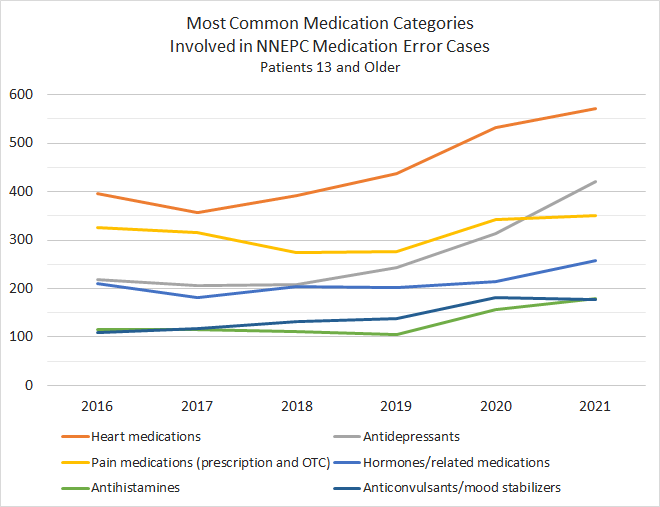Over the course of the COVID-19 pandemic, the NNEPC has seen a significant increase in medication errors among adults. These potential poisonings are occurring in every age group, from young adults in their 20s all the way to older adults in their 90s. In addition, medication errors were up among children and teens in 2021 after falling for the previous several years.
There are many types of medication errors. Accidentally taking a dose twice is the most common type we receive calls about. Calls about other types of dosing errors, such as measuring out the wrong amount, are also fairly common, along with calls about taking the wrong medication, such as taking a spouse’s, sibling’s or pet’s medication by mistake.
Heart medications and antidepressants were the drug categories most often involved in medication errors we helped manage in 2021, and these were also the categories with the biggest increases over the past two years.
Errors involving hormone-related medications (such as for diabetes or thyroid issues), antihistamines, and anticonvulsants or mood stabilizers (such as lamotrigine or gabapentin) are also up significantly. There has been an increase in errors involving acetaminophen, and pain medications as a group (both prescription and over-the-counter) are the third most common type of drug involved in medication mistakes.
 There are many possible reasons for these increases. The pandemic has brought on many new stresses and distractions, which can make errors more likely. In the case of antidepressants and other mental health medications, CDC survey data suggest there has been a notable increase in the number of prescriptions over the past year and a half or so, and with any substance, wider availability means more opportunity for poisonings.
There are many possible reasons for these increases. The pandemic has brought on many new stresses and distractions, which can make errors more likely. In the case of antidepressants and other mental health medications, CDC survey data suggest there has been a notable increase in the number of prescriptions over the past year and a half or so, and with any substance, wider availability means more opportunity for poisonings.
Tools for preventing medication mishaps
Fortunately, there are many tools available to help you and your family manage your medications, including a number available on our website.
- Our 2012 booklet Medication: What You Need to Know covers the basics of medication in an easy-to-read format. The booklet is available as a PDF download, or you can request a hard copy. While the booklet is specifically aimed at adults 60 and older, the information can be of use to people of all ages.
- Along with the booklet, we have a ready-made medication calendar to help you keep track of your medications and when you’ve taken them. Even if you don’t use our calendar, consider using it as a template to create your own. A calendar can help ensure you don’t miss a dose or take one twice.
- Keeping a list of your medications is important for you and your health care providers to prevent interactions. Consider downloading our medication chart, medication wallet card, or both to keep track of the medications, vitamins and supplements you take.
- Keeping your medications in their original container is the ideal storage method. However, we know that doesn’t work for everyone. A child-resistant pill box is the second best way to store and track your medications. Make sure any pill box you choose is labelled as child-resistant, and keep in mind that it is only resistant–nothing is truly child-proof. Given more than a few minutes, some children can get into anything! We have some child-resistant pill boxes available to order for free from our website.
Safely using, storing and disposing of your medications also helps prevent poisonings of children and pets. Learn more about safe disposal on our Medication Disposal page.
Remember, we are here to provide fast help 24/7 regarding any kind of medication error, whether you gave your child a double dose, you took the dog’s medication, or anything in between. Call us at 1-800-222-1222, chat online or text the word POISON to 85511.




